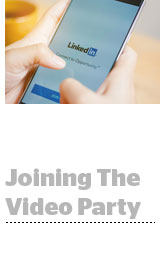 Here’s today’s AdExchanger.com news round-up… Want it by email? Sign up here.
Here’s today’s AdExchanger.com news round-up… Want it by email? Sign up here.
Pivot To Video
LinkedIn is finally selling video ads: native, autoplay and sound-off. Because LinkedIn has a subscription revenue stream, it hasn’t launched ad products as aggressively as other platforms. But video is increasingly seen as a core social feature. And for LinkedIn the move supports its broader “sell” to marketers. “We know that viewers, when they watch video, the message is much more likely received when compared to just text,” says Sudeep Cherian, head of product marketing for LinkedIn’s ads business. “It’s not a nice-to-have, it’s a must-have.” More at Recode.
View From The Top
Today’s platform giants – Google, Apple, Facebook and Amazon (GAFA) – have consolidated power and growth to an unprecedented degree. “Wintel” (a portmanteau of former duopoly members Windows and Intel) had less than $50 billion in annual sales during its peak in 2001. GAFA cleared $450 billion last year. Microsoft and Intel have grown too – nowadays Wintel annual revenue is more like $150 billion – but there has been a “fundamental change in what it means to be a leading tech company,” according to Andreessen Horowitz partner Benedict Evans. In a blog post, Evans argues this change is good for consumer choice. “If I want a smart speaker, I can choose from two with huge, credible platforms behind them today, and probably four in six months, each making them for different reasons with different philosophies,” Evans writes. “No-one applied that kind of pressure to Microsoft.” Read the blog post here.
Walking The Line
As “branded content” becomes common, publishers are under pressure to stand out. Vox is betting on a new branded content format that mimics its trademark “explainer” style of reporting. A new team, called the Explainer Studio, is an extension of Vox’s 40-person branded content team. The New York Times T Brand Studio, a similar internal team run like a branded content studio, has grown to over 150 employees and is expected to represent more than a fifth of the publisher’s overall digital ad revenue. But writing stories “designed to have the look and feel of a publisher’s editorial content has provoked concerns from industry watchdogs who say that the advertisements blur distinctions between news and advertising.” More at The WSJ.
But Wait, There’s More!
This post was syndicated from Ad Exchanger.

More Stories
Deep Blue Is Building a Women’s Sports Yacht Club at Cannes
Sinclair SVP of Station Operations to Retire in June
Netflix Sets Up Killer You Marketing Activation With Penn Badgley